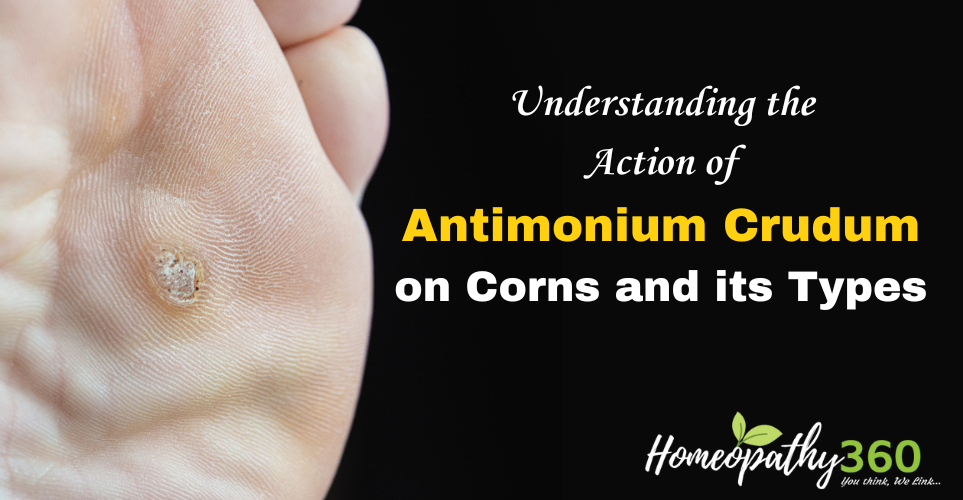
Abstract:
This article deals with homoeopathic approach in the case of corn by most suitable homoeopathic medicine. As always affected internally followed by external sufferings. All causes must be investigated first by physicians followed by individualization of each patient; most similar homoeopathic, dynamic medicine should be prescribed to achieve complete cure. Here the role of Antimonium crudum is described in the case of corns.
Key-Words: Antimonium Crudum, Corns, Heloma Durum, Heloma Molle, Seed Corns
Introduction:
Antimonium crudum is a well-known remedy in homoeopathy that has been utilized for various conditions, including corns. Corns are common foot ailments characterized by thickened areas of skin that develop in response to friction or pressure. This article delves into the action of antimonium crudum on corns and explores the different types of corns in detail.
Antimonium Crudum: An Overview
Antimonium crudum, derived from crude antimony sulphide, is a versatile remedy known for its affinity for the skin, mucous membranes, and digestive system. In homoeopathy, it is often prescribed for conditions such as indigestion, skin eruptions, and respiratory ailments. Its action on corns is attributed to its ability to address the underlying causes of these growths, including mechanical irritation, dampness, and constitutional factors.
Action on Corns:
1. Mechanical Irritation: Antimonium crudum is particularly effective for corns that develop due to mechanical irritation, such as ill-fitting shoes or repetitive friction. It helps alleviate the pain and discomfort associated with these corns by addressing the underlying inflammation and promoting healing of the affected skin.
2. Dampness: Corns that arise in moist or damp conditions are also well-suited to treatment with antimonium crudum. The remedy helps dry out the affected area and reduce excessive moisture, thereby preventing further corn formation and promoting resolution of existing corn.
3. Constitutional Factors: In some cases, corns may be indicative of deeper constitutional imbalances or susceptibility to certain types of skin conditions. Antimonium crudum addresses these underlying factors by restoring balance to the individual’s overall health and promoting a more harmonious response to external stimuli.
Types of Corns:
1. Hard corns (heloma durum): Hard corns typically develop on weight-bearing areas of the feet, such as the tops or sides of toes, and are characterized by a dense, thickened core of dead skin surrounded by a ring of inflamed tissue. They are often caused by prolonged pressure or friction and may be exacerbated by ill-fitting footwear. Antimonium crudum is beneficial for hard corns that are painful, inflamed, and aggravated by pressure.
2. Soft corns (heloma molle): Soft corns occur between the toes, where moisture and friction combine to soften the skin and create a painful, macerated lesion. These corns are prone to infection and may cause considerable discomfort, especially during walking or other activities. Antimonium crudum helps alleviate the pain, redness, and moisture associated with soft corns, promoting healing and preventing recurrence.
3. Seed corns: Seed corns are small, superficial corns that often appear on weight-bearing areas of the feet, such as the heels or balls of the feet. They are characterized by their tiny size and tenderness, which may be exacerbated by pressure or walking barefoot. Antimonium crudum can be useful for seed corns that are tender to the touch and worsened by pressure, helping to soothe discomfort and promote resolution.
Conclusion:
Antimonium crudum offers a valuable therapeutic option for the treatment of corns, addressing both the symptomatic manifestations and underlying causes of these common foot ailments. By understanding its action on mechanical irritation, dampness, and constitutional factors, homoeopaths can effectively prescribe antimonium crudum for various types of corns, promoting relief and healing for affected individuals.



